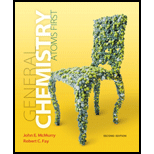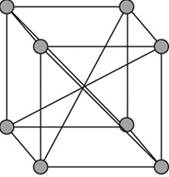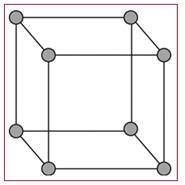
Concept explainers
Interpretation:
The closest cubic cell where crystallization of Titanium takes places has to be identified.
Concept Introduction:
Body-centered unit cell:
A body – centered cubic cell is a type of unit cell with atoms arranged in all the vertices of the unit cell and one atom at the center of the cube.

Figure 1
A body – centered cubic unit cell has its all the eight vertices arranged with atoms in it. Eight atoms are arranged in a simple cubic unit cell in eight vertices. Each atom in a vertex is shared by eight neighboring unit cells such that each cubic unit cell has
Face-centered cubic:
In face-centered cubic unit cell, each of the six corners is occupied by every single atom. Each face of the cube is occupied by one atom.
Each atom in the corner is shared by eight unit cells and each atom in the face is shared by two unit cells. Thus the number of atoms per unit cell in FCC unit cell is,
Simple cubic unit:
A simple cubic unit cell is the simplest form of a cubic unit cell. A cube has eight vertices, twelve edges and six faces. Similarly a cubic unit cell has eight vertices, twelve edges and six faces. If in a cubic unit cell, the components occupy only the eight vertices, then the unit cell is known as simple cubic unit cell.

Figure 2
A simple cubic unit cell has its all the eight vertices arranged with atoms in it. Thus eight atoms are arranged in a simple cubic unit cell in eight vertices. Each atom in a vertex is shared by eight neighboring unit cells. Each layer of a lattice has four unit cells and the upper or lower to that layer has four unit cells. So, each simple cubic unit cell has
Want to see the full answer?
Check out a sample textbook solution
Chapter 10 Solutions
General Chemistry: Atoms First
- A portion of the crystalline lattice for potassium is illustrated below. (a) In what type of unit cell are the K atoms arranged? A portion of the solid-state structure of potassium. (b) If one edge of the potassium unit cell is 533 pm, what is the density of potassium?arrow_forwardSpinel is a mineral that contains 37.9% aluminum, 17.1% magnesium, and 45.0% oxygen, by mass, and has a density of 3.57 g/cm3.The edge of the cubic unit cell measures 809 pm. How many of each type of ion are present in the unit cell?arrow_forwardTungsten crystallizes in the unit cell shown here. Unit cell for tungsten (a) What type of unit cell is this? (b) How many tungsten atoms occur per unit cell? (c) If the edge of the unit cell is 316.5 pm, what is the radius of a tungsten atom? (Hint: The W atoms touch each other along the diagonal line from one comer of the unit cell to the opposite comer of the unit cell.)arrow_forward
- The CsCl structure is a simple cubic array of chloride ions with a cesium ion at the center of each cubic array (see Exercise 69). Given that the density of cesium chloride is 3.97 g/cm3, and assuming that the chloride and cesium ions touch along the body diagonal of the cubic unit cell, calculate the distance between the centers of adjacent Cs+ and Cl ions in the solid. Compare this value with the expected distance based on the sizes of the ions. The ionic radius of Cs+ is 169 pm, and the ionic radius of Cl is 181 pm.arrow_forward8.48 Why must the vapor pressure of a substance be measured only after dynamic equilibrium is established?arrow_forwardSilicon carbide, SiC, is a very hard, high-melting solid. What kind of crystal forces account for these properties?arrow_forward
- Calculate the percent of volume that is actually occupied by spheres in a body-centered cubic lattice of identical spheres You can do this by first relating the radius of a sphere, r, to the length of an edge of a unit cell, l. (Note that the spheres do not touch along an edge but do touch along a diagonal passing through the body-centered sphere.) Then calculate the volume of a unit cell in terms of r. The volume occupied by spheres equals the number of spheres per unit cell times the volume of a sphere (4r3/3).arrow_forwardCalcium oxide consists of a face-centered cubic array of O2 ions, with Ca2+ ions at the center of the unit cell and along the centers of all 12 edges. Calculate the number of each ion in the unit cell.arrow_forwardCalculate the percent of volume that is actually occupied by spheres in a face-centered cubic lattice of identical spheres. You can do this by first relating the radius of a sphere, r, to the length of an edge of a unit cell, l. (Note that the spheres do not touch along an edge but do touch along the diagonal of a face.) Then calculate the volume of a unit cell in terms of r. The volume occupied by spheres equals the number of spheres per unit cell times the volume of a sphere (4r3/3).arrow_forward
- What is a lattice? What is a unit cell? Describe a simple cubic unit cell. How many net atoms are contained in a simple cubic unit cell? How is the radius of the atom related to the cube edge length for a simple cubic unit cell? Answer the same questions for the body-centered cubic unit cell and for the face-centered unit cell.arrow_forwardMn crystallizes in the same type of cubic unit cell as Cu. Assuming that the radius of Mn is 5.6% larger than the radius of Cu and the density of copper is 8.96 g/cm3, calculate the density of Mn.arrow_forwardMnO has either the NaCI type structure or the CsCI type structure (see Exercise 69). The edge length of the MnO unit cell is 4.47 10-8 cm and the density of MnO is 5.28 g/cm3. a. Does MnO crystallize in the NaCl or the CsCl type structure? b. Assuming that the ionic radius of oxygen is 140. pm, estimate the ionic radius of manganese.arrow_forward
 Chemistry: Principles and PracticeChemistryISBN:9780534420123Author:Daniel L. Reger, Scott R. Goode, David W. Ball, Edward MercerPublisher:Cengage Learning
Chemistry: Principles and PracticeChemistryISBN:9780534420123Author:Daniel L. Reger, Scott R. Goode, David W. Ball, Edward MercerPublisher:Cengage Learning ChemistryChemistryISBN:9781305957404Author:Steven S. Zumdahl, Susan A. Zumdahl, Donald J. DeCostePublisher:Cengage Learning
ChemistryChemistryISBN:9781305957404Author:Steven S. Zumdahl, Susan A. Zumdahl, Donald J. DeCostePublisher:Cengage Learning Chemistry: An Atoms First ApproachChemistryISBN:9781305079243Author:Steven S. Zumdahl, Susan A. ZumdahlPublisher:Cengage Learning
Chemistry: An Atoms First ApproachChemistryISBN:9781305079243Author:Steven S. Zumdahl, Susan A. ZumdahlPublisher:Cengage Learning
 General Chemistry - Standalone book (MindTap Cour...ChemistryISBN:9781305580343Author:Steven D. Gammon, Ebbing, Darrell Ebbing, Steven D., Darrell; Gammon, Darrell Ebbing; Steven D. Gammon, Darrell D.; Gammon, Ebbing; Steven D. Gammon; DarrellPublisher:Cengage Learning
General Chemistry - Standalone book (MindTap Cour...ChemistryISBN:9781305580343Author:Steven D. Gammon, Ebbing, Darrell Ebbing, Steven D., Darrell; Gammon, Darrell Ebbing; Steven D. Gammon, Darrell D.; Gammon, Ebbing; Steven D. Gammon; DarrellPublisher:Cengage Learning Chemistry: The Molecular ScienceChemistryISBN:9781285199047Author:John W. Moore, Conrad L. StanitskiPublisher:Cengage Learning
Chemistry: The Molecular ScienceChemistryISBN:9781285199047Author:John W. Moore, Conrad L. StanitskiPublisher:Cengage Learning





